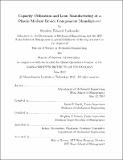| dc.contributor.advisor | David E Hardt and Stephen C Graves. | en_US |
| dc.contributor.author | Laskowski, Stephen Edward | en_US |
| dc.contributor.other | Leaders for Global Operations Program. | en_US |
| dc.date.accessioned | 2017-10-18T14:43:02Z | |
| dc.date.available | 2017-10-18T14:43:02Z | |
| dc.date.copyright | 2017 | en_US |
| dc.date.issued | 2017 | en_US |
| dc.identifier.uri | http://hdl.handle.net/1721.1/111871 | |
| dc.description | Thesis: S.M., Massachusetts Institute of Technology, Department of Mechanical Engineering, in conjunction with the Leaders for Global Operations Program at MIT, 2017. | en_US |
| dc.description | Thesis: M.B.A., Massachusetts Institute of Technology, Sloan School of Management, in conjunction with the Leaders for Global Operations Program at MIT, 2017. | en_US |
| dc.description | This electronic version was submitted by the student author. The certified thesis is available in the Institute Archives and Special Collections. | en_US |
| dc.description | Cataloged from student-submitted PDF version of thesis. | en_US |
| dc.description | Includes bibliographical references (pages 93-94). | en_US |
| dc.description.abstract | An understanding of capacity utilization within any manufacturing system is critical in setting operational strategy. Production lines and machines must have their performance accurately tracked and available for reporting if a business is to continually improve their performance. With capacity utilization and manufacturing performance known, a business can provide short-term corrections and also adapt its manufacturing capabilities to meet long-term market requirements. Boston Scientific is a manufacturer of medical devices and is known for its ability to scale up new technologies through the use of an applied Lean Manufacturing framework in its final product assembly. The company also internally houses several component manufacturing groups that supply its assembly operations. While the company has a defined strategy for its assembly operations, strategy for its internal components suppliers is less clear. This thesis discusses building the foundation to transform the Spencer Components manufacturing group into a world class plastics operation. In particular, the ability to utilize manufacturing data to inform short and long term decisions is a critical foundation for any organization in its quest to become World Class. This thesis studies how Spencer Components, a Boston Scientific internal component manufacturer, utilizes newly acquired manufacturing data to improve its operations and begin its transformation into a world class high-mix low-volume plastic components manufacturer. Prior to this research internship, no electronic performance data systems were in use, and Boston Scientific was blind to the operational performance of Spencer Components. While the technology of the new data system is several decades old, a considerable amount of effort was required to successfully implement it within the well-established manufacturing system. Upon implementation equipment utilization improved and inventory targets that previously appeared unattainable were achieved. In addition, a continuous improvement environment was created and allowed Lean Manufacturing techniques such as Single Minute Exchange of Die (SMED) and operational improvements such as Economic Order Quantities (EOQ) to be implemented, tracked, and iteratively improved. A new capacity planning tool was created to identify long-term capital requirements associated with component demand. While Spencer Components is not yet a World Class manufacturer, it now has the tools to achieve its goal of becoming one. | en_US |
| dc.description.statementofresponsibility | by Stephen Edward Laskowski. | en_US |
| dc.format.extent | 94 pages | en_US |
| dc.language.iso | eng | en_US |
| dc.publisher | Massachusetts Institute of Technology | en_US |
| dc.rights | MIT theses are protected by copyright. They may be viewed, downloaded, or printed from this source but further reproduction or distribution in any format is prohibited without written permission. | en_US |
| dc.rights.uri | http://dspace.mit.edu/handle/1721.1/7582 | en_US |
| dc.subject | Mechanical Engineering. | en_US |
| dc.subject | Sloan School of Management. | en_US |
| dc.subject | Leaders for Global Operations Program. | en_US |
| dc.title | Capacity utilization and lean manufacturing at a plastic medical device components manufacturer | en_US |
| dc.type | Thesis | en_US |
| dc.description.degree | S.M. | en_US |
| dc.description.degree | M.B.A. | en_US |
| dc.contributor.department | Leaders for Global Operations Program at MIT | en_US |
| dc.contributor.department | Massachusetts Institute of Technology. Department of Mechanical Engineering | |
| dc.contributor.department | Sloan School of Management | |
| dc.identifier.oclc | 1005923302 | en_US |
